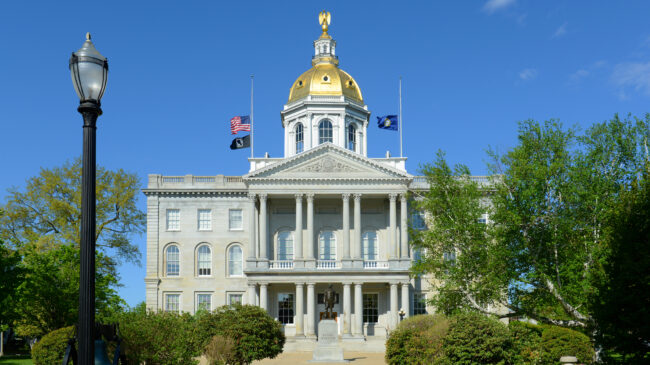New Hampshire Gov. Chris Sununu signaled recently he would sign a proposal authorizing marijuana sales through state-owned liquor stores. Sununu issued a statement to that effect while alluding to the failure of the State Senate to support a bipartisan marijuana legalization bill from the House.
House Bill 639 was sponsored by six House Republicans and five House Democrats. It would have created a regulated market for the legal adult use of marijuana and imposed a moderate 8% retail excise tax. Importantly, the bill would have created an open market without arbitrary caps on the number of licenses available, and it did not allow local governments to prohibit marijuana licensees from operating within their borders.
High tax rates and local bans have allowed illicit marijuana retailers to continue to prosper in states like California, where four-fifths of municipalities have banned legal cannabis retailers. Licensing caps unnecessarily raise the barriers to entry in the legal marijuana industry, discouraging entrepreneurship by those with modest means and encouraging bribery and public corruption.
Reason Foundation was able to provide guidance on the language of House Bill 639. It was passed by the House by a vote of 272-109. However, all but one Senate Republican voted to block the bill, causing it to go down by a vote of 10-14. One Senate Democrat also opposed it.
Gov. Sununu’s call for new legislation to authorize state-run marijuana sales echoes an idea that has come up repeatedly in New Hampshire. Just last year, Reason Foundation analysts reviewed a similar proposal from the Granite State. It would have reserved the retail function to state-owned liquor stores while allowing private companies to cultivate, manufacture, package, and test the underlying products. Interestingly, a fiscal note submitted by the New Hampshire Liquor Commission noted that the agency held no expertise regarding cannabis products and would need to hire a contractor to “advise the commission on product selection, aid in training cannabis store personnel and purchase the cannabis on behalf of the commission.”
The agency’s lack of detailed marijuana knowledge is only a minor concern, however, when compared to the criminal implications of operating state-run marijuana stores. The manufacture and distribution of any Schedule I substance, as designated under the federal Controlled Substances Act—including marijuana—is a federal crime. Any entity that is organized to conduct this activity is a federal criminal enterprise subject to an array of penalties under federal racketeering and kingpin statutes. States are not immune to prosecution under these laws. That means, under this proposal, New Hampshire’s assets could be seized and its officers and employees arrested by federal law enforcement if federal authorities chose to do so.
Policymakers needn’t assume these risks. Experience has shown there is no shortage of private citizens willing to risk their own capital and freedom to run a legal marijuana business if states only grant them the license to do so.
Gov. Sununu says he is concerned about marijuana products being marketed to children and that state-run stores would prevent marijuana products from being advertised on “billboards, commercials and digital ads.” Simple regulations on advertising by commercial licensees could also accomplish this goal.
Sununu says he wants to avoid the concentration of retail functions in small corridors. This is typically the result of licensees crowding into one municipality when other municipalities ban commercial sales. House Bill 639 did not authorize local bans. Further, simple zoning or spacing requirements would certainly have prevented this concentration.
New Hampshire is the only state in New England where recreational marijuana use by adults is illegal. A recent poll indicates 71% of residents support legalization, including 62% of Republicans. As the governor says, “It is reasonable to assume change is inevitable.”
That change should incorporate the best lessons learned from other states that have enacted legal adult-use cannabis markets, including private risk-taking and entrepreneurship. House Bill 639 was a carefully considered bipartisan proposal, but the bill now being drafted in the legislature cannot overcome the fundamental risks to the state.
A government monopoly not only violates the basic tenets of free enterprise, but it would also invite federal authorities to arrest state workers, up to and including Gov. Sununu himself.

